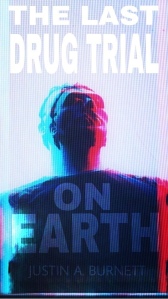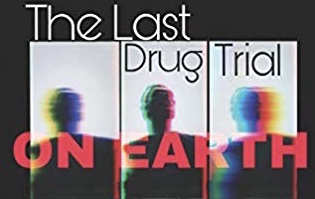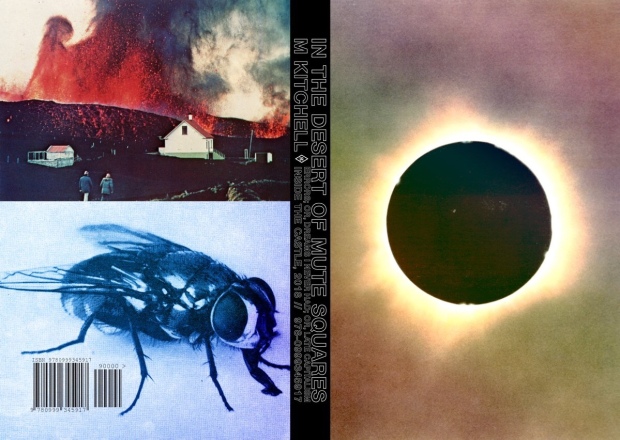by
Daulton Dickey.
Primordial: An Abstraction
by D. Harlan Wilson
Anti-Oedipus Press • September 3, 2014
Paperback: 167 pages • 5×8 • $13.95 • ISBN 978-0-9892391-5-8
In “Giles Goat-Boy” (1966), John Barth used universities and academia as the launching pad for an allegory of the cold war. Written in the style of a hero’s journey, and injected with liberal doses of absurdity, Barth’s story stomped across and skewered the cultural expectations, and evaluation, of academic and university life—which in his case doubled as the factionalism and jingoism of competing ideological and military powers.
Where Barth’s novel was a comic, absurd, metafictional romp through a city-sized university, author D. Harlan Wilson’s “Primordial: An Abstraction” is a more visceral—though equally absurd and darkly funny—evisceration of academia and college life, and the strangeness of life in general. It is unrelenting in its absurdity, it’s vitriol, it’s energy —and it’s also a meditation on the redundancies of life, of academia, and of intellectual and individualistic pursuits.
—and it’s also a meditation on the redundancies of life, of academia, and of intellectual and individualistic pursuits.
“Repetition is just as good as karma,” the narrator tells us. “Once you embrace it, once you ingest it—you’re bound to wallow in it.” (Wilson: 151)
The story is relayed in the first person by an unnamed professor and academic whose Ph.D. has been revoked. He had been “practicing a questionable mode of pedagogy […] writing a toxic strain of theory.” (Wilson: 11) Without his degree, without his work, he has admittedly lost his identity, so he must return to university to regain both.
This is the coil around which the story is wound, and from it springs humor, farce, and social and cultural commentary, and even brief didactic and philosophical asides. It is a short, minimalist novel told in deceptively simple yet beautifully rendered and subtly complex prose.
From his tyrannical control of his roommates, to his dismissal of his professors, the narrator flows from one facet of college life to the next. But this isn’t your average novel, and it’s not a detailed account of the ins-and-outs of college life. Instead, it is, in a way, an evisceration of academia-as-bureaucracy.
It’s also a book willing to take jabs at boring or uninterested—probably tenured—professors. And it takes a few pot shots at the sexually promiscuous culture, too, in which the students at this university forego casual sex in lieu of making pornos—in the library, the cafeteria, everywhere; a logical progression of sex obsessed, and sexually explicit, youth culture.
“Primordial: An Abstraction” is, in some ways, a Kafkaesque jab at bureaucracy where the acquisition of knowledge, even trivia, becomes the narrator’s castle. Through inquiring about details of his courses and his curriculum, the narrator is confronted with confusion and scorn without getting the answers he requires. Like Kafka’s doomed K., the narrator here can’t even get a straight answer when seeking trivia, in this case about a long dead pop star:
I say, “Did Mama Cass really choke to death on a hamburger?”
The grad student looks at the Professor. The Professor looks at the Dean. The Dean looks at another Dean. The other Dean looks at another Dean. That Dean looks at the Provost. The Provost looks at the President. The President looks at his mom.
His mom shrugs.
I say, “Well what good are you people? What good is any of this?” I gesticulate at the University. (Wilson: 94)
One subtext that sticks out is the juxtaposition of violence and academia, as if Wilson—or the narrator—is lobbing complaints against the diminished cultural stature of intellectualism and academia in favor of violence and war. The violence is also what you might expect when you force a brute—whether it’s a homo sapien or a simian—into a rationalized, institutional setting.
But in “Primordial: An Abstraction,” the violence largely springs from the once-and-future academic himself: the unnamed narrator. Muscular, he can bench 300 pounds, and he sticks to strict exercise and dietary habits. He also possesses the temper of a banshee on meth.
In many ways, he’s like a cross between Raoul Duke, Henry Rollins, and Jacques Lacan. He possesses a fiery intellect and an inability to refrain from ridiculing—or even assaulting—those he feels worthy. He is, in a sense, the muscular, short-tempered incarnation of Ignatius J. Reilly—if Sam Peckinpah had directed an adaptation of “A Confederacy of Dunces.”
But despite its aggression, the book is funny, with dialogue veering into Marx Brothers, Monty Python, and Donald Barthelme-esque territory—but devoid of puns or other cheap humor. It’s farcical but not whimsical or—the dread of all dreads—zany. It’s funny the way Hunter S. Thompson was funny: vicious, cruel, aggressive. But this book possess the spirit of farce absent f rom the works of a writer like Thompson.
rom the works of a writer like Thompson.
Also, like the works of a writer like Thompson, or even Anthony Burgess, much of the humor is born out of a combination of the situation and the character of the narrator himself:
Sometimes, when I am revising my manuscripts, I forget to breath. My roommates have to remind me. I don’t like it. I don’t like them to talk at all. But they see my face go red and then gray and finally purple and despite how much they hate me they can’t shoulder the burden of my potential death. Stockholm Syndrome.
Some of them enjoy it when I flog them.
One of them asks for it.
I don’t enjoy flogging people. Not for any reason. But the Law is the Law and somebody must uphold it.
I use a cat o’ nine tails that I purchased as a Boy Scout. I can’t remember where I purchased it. But I had my uniform on when I gave the cashier my bills and coins.
I never stop flogging my roommates until I draw blood and they are sufficiently terrorized, i.e., happy. (Wilson: 73)
School life and the rigors of academic pursuits are presented vaguely—an abstraction. Work is never mentioned in detail. Classes are never mentioned in detail. This vagueness is possibly a commentary on the routine—the redundancy—of college life; or, perhaps the narrator is too narcissistic or solipsistic to dwell on anything other than himself: this is a fiercely subjective narrative.
Classrooms, although presented vaguely, are still presented as farcical—where the farce is the product of the narrator’s aggressive personality and the professors’ tired routines. He beats and bullies teachers, he dismisses or bullies students; and when he gets on with students, he ignores everything around him in lieu of conversation, even if it disrupts class. Also throughout the novel, there’s an underlying shot at the state of the hierarchy of modern, corporate-influenced universities.
In the hands of a lesser writer, a book like this might be bloated and long winded and tangential. But in Wilson’s hands, it’s navigated brilliantly and smoothly by Wilson’s mastery of the craft and his sparse, concise prose.
None of the faculty retire. They work until they die, often in the middle of lectures, barely able to articulate a coherent sentence or even stand up straight.
Administrators typically retire after two or three years, at which point they generally become fulltime Rotarians, spend more time on the golf course and the tennis court, and live forever.
This is not the case with the President, Provost, and several other kakistocrats.
They never retire.
They remain in office until somebody shoots them and claims their thrones.
I don’t know what happens to the staff. They lack one of two vital ontological components: the power of capital or the awareness of intelligence. Hence nobody at the University cares about them. (Wilson: 130)
Through its jabs at university life, through its invocations of violence, through its didactic tangents, brief as they may be, something close to humanity punches through every now and then, and the narrator is cast as more than an aggressive bully.
At its core, the novel is an existential examination of life, knowledge, and the pursuit of what once seemed graspable. Memories pop into the narrator’s mind, and they tend to show him as vulnerable, naive, uncertain. On the rare occasion he lets down his guard, he reveals himself as confused and as vulnerable as everyone else. “I write because I’m weak!” he shouts at one point.
And though, like K. in Kafka’s “The Castle,” or like George Giles in Barth’s magnum opus, the narrator continues to pursue a goal not likely attainable, and although his anger and aggression more often than not defines him, he continues his quest. For, in the end, the quest is all he has. It defines him. After losing his Ph.D., his identity, what does he have left?
“Most of adult life is spent discovering the mystery of how very little you matter,” he says early in the novel. And it’s a profound line smuggled into a fierce, aggressive, and philosophical gem of a novel, which is one of the best books of the year.
Click here to buy the book (and you should buy it here; this is an indie publisher; support them directly)





 Gonzalo lives a strange existence. Like his parents before him, he’s a cemetery man. Stuck in rut, Gonzalo wants something more. Bitter at his lot, he stumbles through life, performing his chores and routines, over and over again.
Gonzalo lives a strange existence. Like his parents before him, he’s a cemetery man. Stuck in rut, Gonzalo wants something more. Bitter at his lot, he stumbles through life, performing his chores and routines, over and over again.
 Darkness lingers everywhere in this world. One way or the other, it will find you. Some of us are prepared for it while it blindsides others. The world itself is dark, filled with strange and perverse creatures. The strangest of which? Humans. While we each struggle with our existential slumbers, we try to make the most of it. Sometimes we’re lead to the light; at other times, chaos.
Darkness lingers everywhere in this world. One way or the other, it will find you. Some of us are prepared for it while it blindsides others. The world itself is dark, filled with strange and perverse creatures. The strangest of which? Humans. While we each struggle with our existential slumbers, we try to make the most of it. Sometimes we’re lead to the light; at other times, chaos.
 my library. One stands out: a woman kneels beside a heavyset bald man, who’s standing and thrusting his arm in the air. The title? Very True Stories Starring Jeff O’Brien.
my library. One stands out: a woman kneels beside a heavyset bald man, who’s standing and thrusting his arm in the air. The title? Very True Stories Starring Jeff O’Brien.
 Reading this book is like viewing Greece through a kaleidoscope. Cycling through every short chapter is akin to twisting the kaleidoscope, revealing new colors and images. In the process, and if you pay close attention, it shows you new ways to view and to understand every person you encounter. And that’s where this book’s greatness lies: in focusing on people, usually eccentrics or strangers most people would overlook or ignore, Paradias imbues this book with humanity, with a genuine respect, even love, or at least empathy, for everyone he encounters.
Reading this book is like viewing Greece through a kaleidoscope. Cycling through every short chapter is akin to twisting the kaleidoscope, revealing new colors and images. In the process, and if you pay close attention, it shows you new ways to view and to understand every person you encounter. And that’s where this book’s greatness lies: in focusing on people, usually eccentrics or strangers most people would overlook or ignore, Paradias imbues this book with humanity, with a genuine respect, even love, or at least empathy, for everyone he encounters. 
 In an age of corporate omnipotence and adherence to formula, experimental fiction has fallen further into the gaps, obscured by the shadows of genre and ‘safe bets.’ Of the few experimental writers working today, D. Harlan Wilson embraces the shadows, creating works without pretense to genre or formulae.
In an age of corporate omnipotence and adherence to formula, experimental fiction has fallen further into the gaps, obscured by the shadows of genre and ‘safe bets.’ Of the few experimental writers working today, D. Harlan Wilson embraces the shadows, creating works without pretense to genre or formulae.
 people live and dwell in violence—directly or indirectly, intentionally or inadvertently. Human civilization is a series of Möbius strips, sets within sets within sets. Some subcultures navigate broader social rules and norms while playing by different sets of rules altogether. These subcultures tend to epitomize violence as means to ends. The violence perpetrated by drug cartels is a prime example of this Möbius strip strip within a Möbius strip, where shadow laws and governments, of sorts, operate within broader society. These cartels reap violence on such massive scales that it’s hard to wrap our heads around. So many tens of thousands of people have been slaughtered that we’ve abstracted the violence—and we view these deaths as nothing more than numbers and statistics.
people live and dwell in violence—directly or indirectly, intentionally or inadvertently. Human civilization is a series of Möbius strips, sets within sets within sets. Some subcultures navigate broader social rules and norms while playing by different sets of rules altogether. These subcultures tend to epitomize violence as means to ends. The violence perpetrated by drug cartels is a prime example of this Möbius strip strip within a Möbius strip, where shadow laws and governments, of sorts, operate within broader society. These cartels reap violence on such massive scales that it’s hard to wrap our heads around. So many tens of thousands of people have been slaughtered that we’ve abstracted the violence—and we view these deaths as nothing more than numbers and statistics. —and it’s also a meditation on the redundancies of life, of academia, and of intellectual and individualistic pursuits.
—and it’s also a meditation on the redundancies of life, of academia, and of intellectual and individualistic pursuits. rom the works of a writer like Thompson.
rom the works of a writer like Thompson.